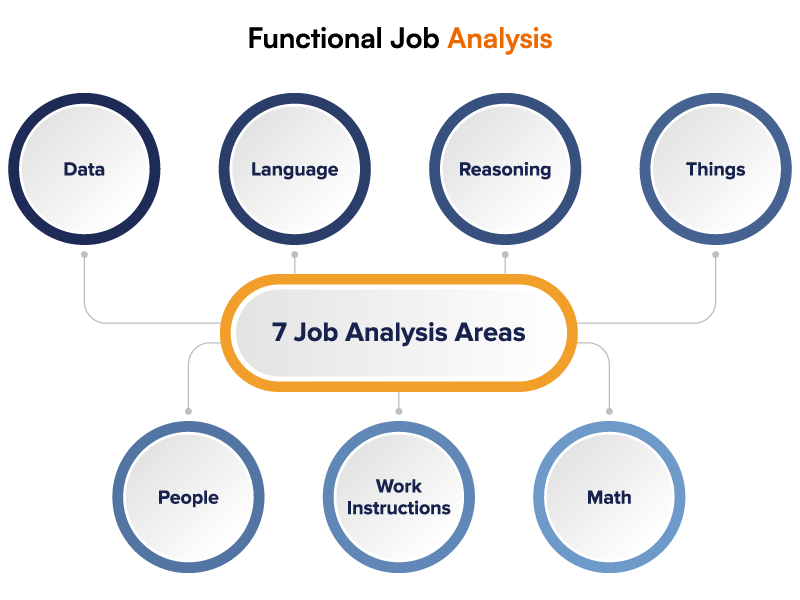Functional Job Analysis
Table of Contents
What is Functional Job Analysis?
Functional Job Analysis (FJA) is a strategy used by the HR department to assess the job roles in an organisation. It identifies the responsibilities and functions that are to be carried out in a job. Companies use this method to create job descriptions accurately and to evaluate the applicants based on that.
Essentially, the job is split into its functional parts which can be independently verified for applicability to the job role. This type of analysis takes an expert who is completely familiar with the job to do the analysis.


7 areas associated with FJA
FJA enables you to categorise and document various aspects of the functional components of any job role in the following areas:
- Data - this section covers everything regarding the information, knowledge and skills required to fulfil the job role
- Reasoning - describes the need for applying logic and reasoning to perform the tasks associated with the role.
- Things - this is a placeholder to understand and document all the tools required in the execution of tasks. The tools could be either hardware or software, depending on the job scope.
- People - different individuals' personalities suit different types of job roles better. This section can be used to identify what traits are needed to be effective on the job.
- Work instructions - this section provides all the relevant instructions which should be followed by the job holder.
- Language - this is where you record the level of communication skills required for the role. Some roles/functions of the job require strong writing skills, while others may require proficient presentation skills. However, in some cases, communication skills may not be deemed as a required attribute.
- Math - this section is associated with documenting the level of mathematical problem-solving required for the role to be effective. Again, the level and complexity of applying math differ from role to role.
Advantages of FJA
Job analysis is the process of understanding what duties, responsibilities and deliverables the job holder would be accountable for. It also uncovers the skills and experience required to perform the job. The analysis output is usually in two documents - Job Role requirement analysis and Job Description. One of the strategies to achieve this is to use FJA. When you fully understand the constituent parts of a role, it becomes easy to define the expectations from that role. Here are the advantages of FJA:
- Thoroughly fact-based - the analyst reviews all the data identified during the investigation to arrive at the output.
- Thorough and scientific - as described earlier, fact finding follows a set of seven areas associated with any role and carefully documents each function/task that the role performs.
- Qualitative - this analysis must be conducted by someone who has complete knowledge of the job role and, as such, enjoys a level of qualitative input from the expert.
FJA process in HRM
Once FJA is selected as the method for job analysis, it is conducted in the below steps.
- Gather all information covering all seven areas for every functional part of the job role.
- Evaluate existing job descriptions against the findings from the analysis and modify them as required.
- Measure and understand the impact of the analysis.

Frequently Asked Questions
What is the importance of functional job analysis?
FJA allows organizations to pay more attention to the employees who will enhance the company’s overall value. In addition to evaluating how well an employee can perform the job, this type of job analysis also describes how the employee’s performance affects his or her teammates. Apart from companies, FJA helps employees understand essential tasks to be accomplished and qualifications to be achieved.
What is a functional job description?
A functional job description is a document wherein all the requirements and responsibilities of a particular job position are mentioned. In addition, it also includes which tasks to be performed and how various requirements will be assessed.
What are the types of job analysis methods?
Following are the different types of job analysis methods.
- Observation Method
- Interview Method
- Technical Conference Method
- Functional Job Analysis
- Questionnaire or Survey Method
- Job Psychographic Method
- Job Analysis by Test
- Record Method
Trending Terms That People Also Look Up
What are the data collected during functional job analysis?
The information to be gathered in an FJA are:
- Tasks and responsibilities
- Workplace surrounding
- Assets and equipment
- Communication/Relations with internal and external people
- Knowledge, Skills and Abilities
Modify your HR and payroll tasks with factoHR today
Let your HR and workforce focus on most important business decisions while factoHR can reduce the burden of daily activities of the organization.

© 2025 Copyright factoHR

